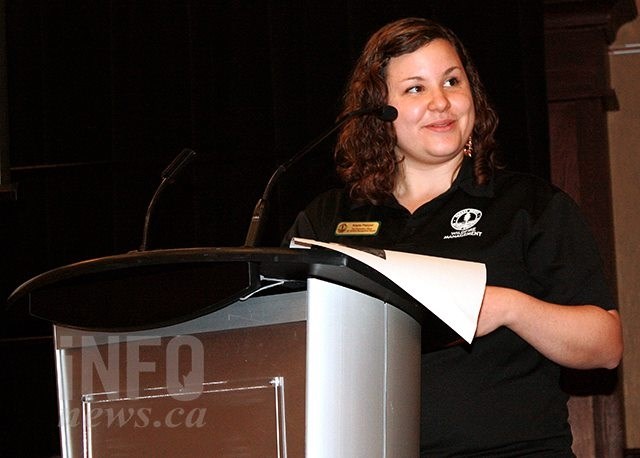
B.C. Wildfire Information Officer Kayla Pepper speaks to emergency personnel about the upcoming wildfire season.
(STEVE ARSTAD / iNFOnews.ca)
April 15, 2015 - 7:00 AM
THOMPSON-OKANAGAN - Be prepared for a fire season reminiscent of 2003 — maybe — regional emergency personnel were told at a workshop this week.
Comparisons to the year more than 200 homes were destroyed in the Okanagan Mountain Fire and 72 homes lost in the McLure Fire were heard at a spring readiness workshop hosted by Emergency Management B.C. at the Penticton Trade and Convention Centre on April 14.
While weather, wildfire and flood forecasts were all discussed a clear message coming out of this year’s morning session was the prediction of a high potential for a bad fire season. A crucial factor mitigating that prediction will be weather behaviour over the next two months.
B.C. Wildfire Information Officer Kayla Pepper said 2015 wildfire activity in March was twice as active as normal in the Kamloops zone.
“All fires have been person caused, and we’ve been seeing volatile fire behaviour for March,” she said, adding April’s fire activity has been normal so far.
Pepper said it is going to take a lot of rain to normalize conditions in the zone, noting the 'crystal ball' forecast for the next few months calls for above normal temperatures and slightly above normal precipitation. She said the condition of larger forest fuels (six inches in diameter and larger) suggest these types of fuels would need 'days of rain' in order to bring drought codes down.
“Once these types of fuels get burning, we have a much more difficult time putting them out, compared to lighter forest cover that flash burn quickly,” she said.
The amount of fire activity in the southern part of the region in the past few years means a fleet of air tractors will be based out of the Penticton Regional Airport this year, in addition to the air tankers traditionally based there.
Pepper said the 2014 wildfire season was below average until mid-July. By the end of the year, however, a total of 1,455 wildfires had burned the third largest number of hectares in a season, at a cost of $300 million.
Water Stewardship section head Shaun Reimer said snowpack levels were below normal across the region for this time of year, ranging from 73 per cent of normal in the Similkameen to 91 per cent of normal at Silver Star. He said Okanagan Lake was a 'half metre higher than we normally want to be this time of year' and suggested the lake could possibly be peaking, up to a month earlier than normal.
Flood risks in the South Okanagan-Similkameen appear to be lower than in previous years, but that could change, Reimer said, noting weather conditions from mid-May to mid June play a large role in flood risk.
“The water’s gone through the system,” he said, noting an early low snowpack in 1990 precipitated water conservation measures on Okanagan Lake. “Then it rained constantly through May and June. There’s always a risk."
Environment Canada meteorologist Lisa Coldwells said last winter Kamloops and Penticton was warmer, but wetter at 140 to 150 per cent of normal precipitation amounts. She said sea surface temperatures were also above normal prior to the start of last winter, getting warmer as the season progressed.
“That is our baseline to start this season,” she said, noting the seasonal forecast gives a general trend but doesn’t take into account anomalies like the two heavy snowfalls experienced in the region over the past winter.
Weather data taken from water temperatures and mild El Nino conditions in the Pacific Ocean indicate the forecast for the next three months to be warmer than normal with normal to slightly above normal precipitation.
“We tried to make a comparison to previous years, just so people could think about what the weather was like. When we correlate our data with that of other years, the year that pops up is 2003,” she said.
To contact the reporter for this story, email Steve Arstad at sarstad@infonews.ca or call 250-488-3065. To contact the editor, email mjones@infonews.ca or call 250-718-2724.
News from © iNFOnews, 2015